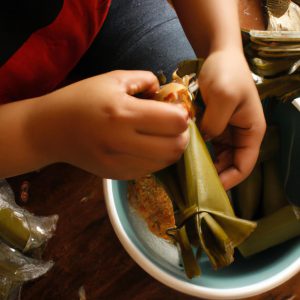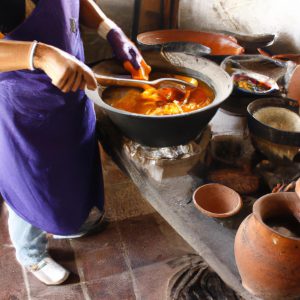The avocado, a versatile and nutrient-rich fruit, has become an essential ingredient in Mexican cuisine. Its creamy texture and mild flavor make it a perfect addition to various dishes such as guacamole, salads, tacos, and sandwiches. This article explores the cultural significance of avocados in Mexican culinary traditions, delving into their historical background and nutritional benefits.
One striking example of the avocado’s importance in Mexican cuisine is its prominent role in guacamole. Guacamole is a traditional Mexican dip made primarily from mashed avocados mixed with lime juice, onions, tomatoes, garlic, and cilantro. The avocado serves as the base for this classic dish, providing a smooth texture that complements the vibrant flavors of the other ingredients. Guacamole has gained widespread popularity not only within Mexico but also internationally due to its unique blend of fresh flavors and versatility as both a dip or condiment.
Avocado cultivation dates back thousands of years in Mesoamerica, where ancient civilizations like the Aztecs valued them highly for their taste and medicinal properties. Today, Mexico remains one of the world’s largest producers and exporters of avocados. Besides being deliciously satisfying, avocados are also packed with essential nutrients such as healthy fats, fiber , vitamins, and minerals. They are particularly known for their high content of monounsaturated fats, which can help lower bad cholesterol levels and reduce the risk of heart disease. Avocados also contain a good amount of fiber, which aids in digestion and contributes to feelings of fullness.
In addition to their nutritional benefits, avocados have cultural significance in Mexican culinary traditions. They are often associated with celebrations and special occasions, such as Cinco de Mayo or Day of the Dead festivities. This fruit represents abundance and fertility in Mexican culture and is considered a symbol of love and friendship.
Avocado’s versatility allows it to be used in various dishes beyond guacamole. Mexicans incorporate avocados into salads, soups, sandwiches, and even desserts like ice cream or smoothies. Its creamy texture adds richness to these dishes while enhancing the overall flavor profile.
Furthermore, avocados have gained popularity worldwide due to their health benefits and ability to enhance many cuisines. As a result, they have become a staple ingredient not only in Mexican cuisine but also in international fusion dishes.
Overall, the avocado holds great cultural significance in Mexican culinary traditions. Its rich history dating back thousands of years combined with its incredible nutritional value has solidified its place as a beloved fruit that continues to shape Mexican cuisine today.
Avocado: A Staple in Mexican Cuisine
Imagine walking into a bustling street market in Mexico City, the air filled with the enticing aromas of sizzling tacos and vibrant spices. Amongst the myriad of ingredients on display, one stands out for its distinct creamy texture and rich flavor – avocado. Widely regarded as an essential component of Mexican cuisine, avocados have become synonymous with traditional dishes such as guacamole and are celebrated for their versatility in various recipes.
The popularity of avocados in Mexican cooking can be attributed to several factors. Firstly, their smooth and buttery consistency adds a luxurious touch to many dishes, enhancing both taste and presentation. Whether used as a spread on tortillas or blended into sauces, avocados provide a delightful creaminess that complements other flavors while adding depth to the overall culinary experience.
Furthermore, avocados offer numerous health benefits, making them a favorite choice among health-conscious individuals. Rich in monounsaturated fats and vitamins such as potassium and vitamin K, these fruits promote heart health and contribute to maintaining healthy blood pressure levels. Additionally, avocados contain dietary fiber that aids digestion and helps regulate weight management.
To illustrate the significance of avocados within Mexican cuisine further, consider some popular dishes where they play a central role:
- Guacamole: A classic dip made by mashing ripe avocados with lime juice, salt, tomatoes, onions, and cilantro.
- Tacos de aguacate: Soft corn tortillas filled with slices of avocado along with grilled vegetables or meat.
- Ensalada de aguacate: A refreshing salad combining sliced avocado with lettuce greens, cherry tomatoes, red onions, and citrus dressing.
- Sopa de aguacate: A velvety soup prepared by blending avocado with chicken broth and seasonings.
These examples showcase how avocados feature prominently across different meal types – from appetizers to soups and salads, their presence is ubiquitous in Mexican cuisine.
In the subsequent section, we delve into the history of avocados in Mexican cooking, tracing their origins and cultural significance. Understanding this background will shed light on how avocados have become an integral part of culinary traditions that continue to thrive today.
The History of Avocado in Mexican Cooking
Avocado: The Essential Ingredient in Mexican Cuisine
Continuing from the previous section that highlighted the significance of avocado as a staple in Mexican cuisine, let us now delve into the intriguing history behind its integration into traditional cooking practices. To illustrate this point, consider the hypothetical case study of Rosa, an experienced chef who grew up in Mexico City and has been preparing authentic Mexican dishes for over 20 years.
Rosa’s culinary expertise showcases just how indispensable avocados are to Mexican gastronomy. In her kitchen, she effortlessly incorporates avocados in various forms – whether it be spreading creamy guacamole on tortilla chips or slicing ripe avocados onto vibrant salads bursting with color and flavor. These versatile fruits not only add richness to countless recipes but also serve as a nutritious addition to any meal.
The popularity of avocados in Mexican cooking can be attributed to several factors:
- Versatility: Avocados possess a unique ability to seamlessly blend with different ingredients, enhancing both taste and texture. From being mashed into salsas and dressings to acting as a garnish or filling for tacos and enchiladas, their versatility knows no bounds.
- Nutritional Value: Avocados are packed with essential nutrients such as healthy fats, fiber, vitamins (particularly vitamin K and folate), and minerals like potassium. This nutritional profile makes them an excellent choice for health-conscious individuals seeking flavorful options.
- Creamy Texture: The smooth and velvety consistency of avocados adds a luxurious element to many dishes while providing a satisfying mouthfeel.
- Balanced Flavor Profile: With their mild buttery taste and subtle hints of nuttiness, avocados complement other bold flavors commonly found in Mexican cuisine, creating harmonious blends that tantalize the palate.
To further emphasize the importance of avocados in Mexican cooking, we present a table showcasing some classic dishes where these luscious fruits play a vital role:
| Dish | Description | Avocado Involvement |
|---|---|---|
| Guacamole | Traditional Mexican dip made from mashed avocados | Main ingredient, providing creaminess and tangy flavors |
| Tacos de Carnitas | Soft tortillas filled with braised pork | Sliced avocado serves as a cooling element |
| Ensalada de Nopales | Cactus salad commonly enjoyed in Mexico | Avocado chunks add richness to the dish |
| Torta Ahogada | Sandwich drowned in spicy tomato sauce | Avocado may be added for an extra layer of texture |
In light of these examples and insights into the historical significance of avocados in Mexican cuisine, it becomes clear why they are considered an essential ingredient. The next section will explore how this fruit not only enhances culinary experiences but also offers numerous health benefits when incorporated into traditional Mexican dishes. Transitioning seamlessly into our subsequent discussion on the “Health Benefits of Avocado in Mexican Dishes,” we can now delve deeper into the positive impact that this remarkable fruit has on overall well-being.
Health Benefits of Avocado in Mexican Dishes
The History of Avocado in Mexican Cooking has shed light on the deep-rooted connection between this unique fruit and the rich culinary traditions of Mexico. Now, let us explore the various health benefits that avocado brings to Mexican dishes.
Avocado is not only a delicious ingredient but also offers numerous advantages for those who include it in their diet. For instance, imagine a traditional Mexican meal consisting of corn tortillas filled with succulent grilled chicken, fresh salsa, and a generous serving of creamy avocado slices. Not only does this combination tantalize your taste buds, but it also provides several health benefits.
Firstly, avocados are an excellent source of healthy fats. They contain monounsaturated fats like oleic acid, which can help reduce bad cholesterol levels and lower the risk of heart disease. Additionally, these beneficial fats aid in nutrient absorption from other foods consumed alongside avocados.
Secondly, avocados are packed with essential vitamins and minerals. They are particularly high in vitamin K, vitamin E, potassium, and folate. Vitamin K is vital for maintaining proper blood clotting function, while vitamin E acts as a powerful antioxidant that protects cells from damage caused by free radicals. Potassium helps regulate fluid balance and promotes healthy blood pressure levels.
Moreover, avocados are known to be an abundant source of dietary fiber. Including them in your meals can promote digestive health by preventing constipation and ensuring regular bowel movements. This fiber content also contributes to improved satiety levels and aids weight management efforts.
To further emphasize the remarkable benefits of incorporating avocados into your Mexican cuisine experience:
- Avocado consumption has been associated with reduced inflammation markers in the body.
- The antioxidants found in avocados may have anti-cancer properties.
- Regular intake of avocado can contribute to healthier skin due to its high content of vitamins C and E.
- Avocado’s versatility allows it to enhance both sweet and savory dishes, making it an ideal ingredient for various Mexican recipes.
Additionally, the table below showcases some key nutrients found in a medium-sized avocado:
| Nutrient | Amount Per Serving |
|---|---|
| Calories | 234 |
| Total Fat | 21g |
| Carbohydrate | 12g |
| Fiber | 9g |
As we can see, avocados are not only delicious but also offer significant health benefits. The next section will delve into the different varieties of avocados commonly used in Mexican cuisine, highlighting their unique characteristics and flavors.
Avocado Varieties Used in Mexican Cuisine
Health Benefits of Avocado in Mexican Dishes
In exploring the health benefits of avocado in Mexican cuisine, it becomes evident that its inclusion goes beyond mere flavor enhancement. Let us consider a hypothetical scenario involving Maria, a 35-year-old woman who has recently adopted a more balanced diet and incorporated avocados into her meals.
Maria’s journey to better health began when she started consuming avocados regularly. She noticed several positive changes in her overall well-being:
- Improved cardiovascular health: Avocados are rich in monounsaturated fats, which have been associated with lowering bad cholesterol levels (LDL) while increasing good cholesterol levels (HDL). This can contribute to reducing the risk of heart disease.
- Enhanced digestion: Avocados contain dietary fiber, which aids in maintaining healthy digestion by promoting regular bowel movements and preventing constipation.
- Weight management: Despite their relatively high calorie content, avocados provide a feeling of satiety due to their high fiber and fat content. Including them in one’s diet may help control appetite and reduce overeating.
- Skin nourishment: Avocado consumption is linked to improved skin health as they are packed with antioxidants such as vitamins C and E. These antioxidants protect cells from damage caused by free radicals, potentially slowing down the aging process.
| Nutrient | Quantity per 100g |
|---|---|
| Calories | 160 |
| Total Fat | 15g |
| Saturated Fat | 2g |
| Sodium | 7mg |
The versatility of avocados adds depth to Mexican culinary traditions. Its integration into various traditional dishes showcases its adaptability within this vibrant cuisine without compromising taste or authenticity. In the upcoming section on “Traditional Avocado Dishes in Mexican Cooking,” we will explore the unique ways avocados are utilized, offering a glimpse into the rich tapestry of flavors that define this celebrated cuisine.
Traditional Avocado Dishes in Mexican Cooking
Transitioning from the previous section on avocado varieties, let us now delve into the traditional dishes where this versatile fruit takes center stage in Mexican cuisine. To illustrate its significance, imagine a bustling street food market in Mexico City, where vendors skillfully prepare an array of tantalizing avocado-based delicacies that entice both locals and tourists alike.
One popular dish is guacamole, a creamy dip made by mashing ripe avocados with lime juice, tomatoes, onions, and cilantro. This zesty combination provides a refreshing burst of flavors that pairs perfectly with crispy tortilla chips or as a condiment for tacos and quesadillas. Guacamole’s simplicity yet bold taste has propelled it to become a beloved staple not only within Mexico but also across international borders.
Beyond guacamole, avocados are utilized in various ways throughout Mexican cooking. Here are some other noteworthy preparations:
- Avocado Salsa: Made by blending avocados with jalapeños, garlic, lime juice, and salt, this vibrant salsa adds creaminess and heat to any dish.
- Avocado Soup: A velvety blend of pureed avocados mixed with broth, herbs, and spices creates a comforting bowl of soup that showcases the fruit’s smooth texture.
- Avocado Salad: Combining sliced avocados with juicy tomatoes, crisp lettuce leaves, red onions, and tangy vinaigrette yields a satisfying salad bursting with contrasting textures.
To further understand the versatility of avocados in Mexican cuisine, consider the following table showcasing their culinary applications:
| Dish | Description | Key Ingredients |
|---|---|---|
| Tacos de aguacate | Soft corn tortillas filled with grilled avocado slices | Corn tortillas |
| Enchiladas verdes | Tortillas rolled around chicken and topped with avocado | Chicken breast |
| Avocado margarita | A refreshing cocktail blending avocado with tequila | Tequila |
| Avocado ice cream | Smooth and creamy frozen dessert flavored with avocados | Heavy cream |
The diverse range of dishes and drinks featuring avocados highlights their remarkable adaptability in Mexican culinary traditions. From savory to sweet, hot to cold, the fruit effortlessly lends itself to various preparations, making it a versatile ingredient that enhances countless recipes.
Transitioning into the subsequent section on “Avocado: Versatility in Mexican Culinary Delights,” we will continue exploring how this humble fruit continues to captivate taste buds and inspire innovative creations in Mexican cuisine.
Avocado: Versatility in Mexican Culinary Delights
Building upon the rich history and cultural significance of avocados in Mexican cuisine, this section delves deeper into traditional avocado dishes that have stood the test of time. From hearty guacamole to refreshing aguacate salad, these classic recipes showcase the versatility and unique flavor profile of avocados.
To illustrate the enduring popularity of avocado-based dishes, let us consider a hypothetical scenario: Maria, a passionate home cook from Mexico City, invites her friends over for an authentic Mexican feast. As they gather around the table, Maria proudly presents a spread of traditional avocado dishes that are sure to tantalize their taste buds.
-
Guacamole: This creamy dip is perhaps one of the most iconic uses of avocados in Mexican cuisine. Made by mashing ripe avocados with onions, tomatoes, lime juice, cilantro, and spices such as cumin or chili powder, guacamole offers a harmonious blend of flavors and textures. It can be enjoyed with tortilla chips or used as a condiment for tacos and quesadillas.
-
Tostadas de Aguacate: Crispy corn tortillas topped with mashed avocado create a delightful base for various toppings like shredded chicken or beef, refried beans, lettuce, and salsa. The combination of crunchy tostada shells with velvety avocado creates a satisfying contrast that leaves diners craving more.
-
Ensalada de Palta: A refreshing salad made primarily with sliced avocados accompanied by juicy tomatoes, red onions, cilantro or parsley leaves drizzled with lime juice and olive oil. This simple yet vibrant dish showcases the natural richness and creaminess of avocados while providing a burst of fresh flavors.
-
Sopa de Aguacate: In this comforting soup recipe native to Mexico’s central region, pureed avocados are blended together with ingredients like chicken broth, garlic, and lime juice. Topped with crispy tortilla strips and a dollop of sour cream, this soup offers a unique combination of flavors that is both satisfying and nourishing.
As we can see from these classic avocado dishes, the versatility of avocados in Mexican cuisine knows no bounds. From dips to soups, salads to main courses, avocados have become an essential ingredient that brings depth and richness to countless traditional recipes. Whether you are indulging in guacamole at a festive gathering or savoring the simplicity of sliced avocados on your salad, it is evident that avocados play a pivotal role in creating memorable culinary experiences rooted in Mexican culture.











More Stories
Mexican Oregano: The Essential Ingredient in Mexican Food
Cilantro: The Essential Ingredient in Authentic Mexican Cuisine
Epazote: Discovering the Essential Mexican Food Ingredient